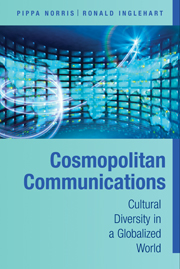Book contents
- Frontmatter
- Contents
- Tables and Figures
- Acknowledgments
- INTRODUCTION
- 1 Is Cultural Diversity Under Threat?
- 2 Theoretical Framework
- PART I FIREWALLS
- PART II CONSEQUENCES
- CONCLUSIONS
- Technical Appendix A: Concepts and Measures
- Technical Appendix B: List of Countries
- Technical Appendix C: Methods and Multilevel Regression Models
- Notes
- Select Bibliography
- Index
- Titles in the Series
1 - Is Cultural Diversity Under Threat?
Published online by Cambridge University Press: 05 June 2012
- Frontmatter
- Contents
- Tables and Figures
- Acknowledgments
- INTRODUCTION
- 1 Is Cultural Diversity Under Threat?
- 2 Theoretical Framework
- PART I FIREWALLS
- PART II CONSEQUENCES
- CONCLUSIONS
- Technical Appendix A: Concepts and Measures
- Technical Appendix B: List of Countries
- Technical Appendix C: Methods and Multilevel Regression Models
- Notes
- Select Bibliography
- Index
- Titles in the Series
Summary
In June 1999, Bhutan, the Himalayan Land of the Thunder Dragon, became the last nation on earth to switch on television. The king lifted the ban on the small screen as part of a radical plan to modernize his isolated mountain kingdom and boost the gross national happiness. The country had traditionally restricted tourism and emphasized spirituality and environmental protection over rampant capitalism. Suddenly, however, an idyllic and peaceful tantric Buddhist culture that had barely changed in centuries, with little access in rural areas to electricity or telecommunications, let alone the Internet, was bombarded by about four dozen cable channels, broadcasting mainly imported programs. For cable subscribers, the nightly onslaught opened the world of Posh and Becks, of Larry King Live and The Simpsons, of the World Wrestling Federation and American Idol, of Bollywood soap operas, of music videos and reality TV, of CNN and BBC World News. The country plugged into the Internet the following year. All too soon reporters noted Bhutan's first wave of crimes – murder, fraud, drug offenses. Bhutan had suddenly crash-landed in the 21st century. Public concern quickly mounted over threats to the country's unique culture. The letters page in local newspapers featured columns of worried correspondence: ‘Dear Editor, TV is very bad for our country; it controls our minds…and makes [us] crazy. The enemy is right here with us in our own living room. People behave like the actors, and are now anxious, greedy and discontented.’
- Type
- Chapter
- Information
- Cosmopolitan CommunicationsCultural Diversity in a Globalized World, pp. 3 - 27Publisher: Cambridge University PressPrint publication year: 2009



